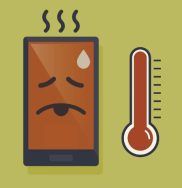
Never Charge Your Cellphone Battery 100% (& 9 Other Tips)
Miles from anywhere, your battery powered devices are a lifeline – especially your phone. Apple, Samsung and most other device manufacturers say to avoid letting the temperature of your battery-powered gadgets dip below 32 degrees Fahrenheit or rise above 95 degrees. So make sure you don’t let them freeze overnight. Or get too hot.
Here are some other dos and don’ts for taking care of your precious smartphones.
DON’T: Burn out your battery
You might be abusing your battery, especially if you have a habit of leaving the screen on, shutting down apps or tossing it in your bag on a particularly frigid morning.
Smartphones are designed to keep apps open in the background. Forcibly closing them may satisfy that little part of your brain that wants to keep things neat and tidy, but because it takes more juice to start an app fresh than to wake it up, you’re beating up on your battery every time you do it.
In either case, damage can occur, lowering – in some cases, dramatically – the life of your battery.
Never leave your laptop or mobile device in a hot car or attempt a sub-zero bike ride with your smartphone strapped to the handlebars. If it’s particularly cold outside, keep your phone in a pocket, so it can benefit from the warmth of your body, and conversely, keep electronics out of direct sunlight for extended periods of time.
2. DO: Charge early and often
Stop with the “all or nothing” thinking when it comes to your smartphone battery. Charging your phone to 100% may seem like a good idea, but if you’re using a high-voltage charger, it can put a strain on your battery. Instead, he said to pull the plug at 80%-90% for optimal usage. Old nickel-based batteries had a memory effect, which meant that if you didn’t charge them from 1-100%, they started to ‘forget’ their maximum capacity. As for the modern-day lithium batteries, the most stress is put on the battery when charging or discharging them fully; both reduce the charging cycles and overall battery life cycle.
Do “more fast top-ups during the day,” versus charging smartphones overnight. Once batteries reach 100%, they will start doing trickle charges, which means that the phone will allow the charge to drop down a little and then recharge to 100%.
Try to keep the battery above 30% or so, letting it discharge occasionally to calibrate the sensors, and you’ll keep your battery healthier longer.
Even the most battery-conscious among us find our phones totally drained from time to time. If you’re on the grid home it’s not a big deal, but what if you’re stuck in an airport terminal or in the desert? To get the absolute fastest charge, toggle on Airplane Mode after plugging it in. Doing so will cut off data connections and should prevent virtually all notifications …